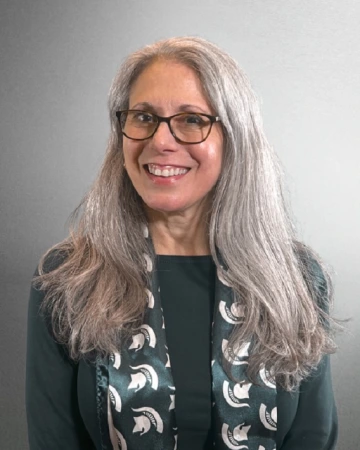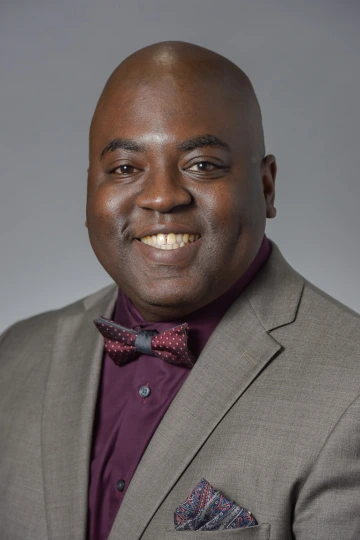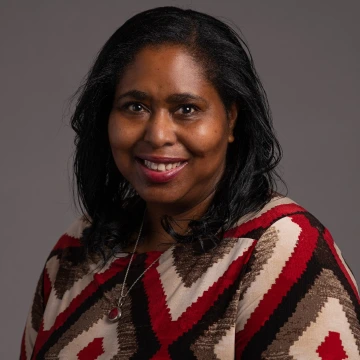Two Wildcat Nursing alums and one PhD student to be inducted as AAN Fellows
Dawn Goldstein, PhD, RN, PMHNP-BC, and Tanya R. Sorrell, PhD, PMHNP-BC, MS, RN, FAANP, both alumna of the University of Arizona College of Nursing’s PhD program, along with current PhD student Jerrol B. Wallace, DNP, MSN, CRNA, FAANA, will be inducted into the 2024 American Academy of Nursing class of Fellows of nurse-leaders during the academy’s annual Health Policy Conference in late October in Washington, D.C.
“We are thrilled to have two former and one current student be named to this impressive honor,” said Brian Ahn, PhD, dean of the University of Arizona College of Nursing. “The ability to impact not only the health-care field but patient care around the country is a driving force for our DNP students. It inspires our faculty, staff and their fellow students.”
“The American Academy of Nursing admits Fellows annually to celebrate work that is high impact, meaningfully improves health and fosters policy change at a national or international level,” said Sheila M. Gephart, PhD, RN, FAAN, a professor and interim chair of the Advanced Nursing Practice and Science Division. “Having two of our alumni and one of our current students selected in this year’s class of Fellows brings our college community great pride. Their military service, national and international leadership, policy and research impact are impressive.”
“In electing Jerrol Wallace to be a Fellow in the AAN, the Academy acknowledges his outstanding accomplishments as a clinical expert and leader in anesthesiology nursing practice and education,” said Pamela G. Reed, PhD, RN, FAAN, a professor in the College. “Equally relevant to this honor is his potential, as a PhD student, to contribute to generating knowledge for nursing practice and health care policy.”
The new cohort of AAN Fellows comes from 37 states, the District of Columbia, Guam and 14 other countries.
“Their expansive body of knowledge will soon bolster the collective impact of over 3,000 Academy Fellows, who together leverage their expertise to advance the Academy’s vision of healthy lives for all people. The 2024 Class of Fellows, selected from a competitive pool of applicants, represents a cross-section of nursing’s most dynamic leaders who are making positive change in their systems and communities to champion health and wellness,” the announcement said.
Below are brief biographies and comments from each of the new AAN Fellows with ties to the College.

Dawn Goldstein
Dawn Goldstein, PhD, RN, PMHNP-BC (Class of 2016)
On being inducted as an AAN Fellow: I am deeply honored to be selected as a Fellow of the American Academy of Nursing, the most prestigious recognition in nursing. This induction is a significant milestone in my career and aligns perfectly with my research and policy goals. It is both a humbling and motivating experience, signaling that I am on the right path and inspiring me to continue making impactful contributions to improve health by impacting policy through nursing leadership, innovation and science.
On the experience at the College of Nursing: It was instrumental in shaping my career. The rigorous academic training and supportive mentorship from faculty such as Terry Badger, PhD, RN, PMHCNS-BC, FAPOS, FAAN, Pamela Reed and Kathleen Insel, PhD, RN, as well as opportunities for hands-on research, provided me with the foundation and confidence to pursue my professional goals. The knowledge and skills I gained there have been critical to my current successes and will continue to guide my future endeavors.
Career path in nursing and nurse education: My career in nursing and nurse education has been driven by a passion for advancing mental health care and developing future nurse leaders. I joined the U.S. Army Reserves as an officer with the Army Nurse Corps, commissioned in 2009. I reached retirement age in 2022 with a final rank of major. I earned a postgraduate certificate with a concentration in Psychiatric Mental Health Nurse Practitioner (PMHNP) in 2014, followed by a PhD from the University of Arizona College of Nursing in 2016. Since completing my education at the University of Arizona, I have held various roles in academia, clinical practice and the military. These positions have allowed me to integrate clinical practice, education and research, further enhancing my contributions to the field of mental health nursing.
I currently serve as a program director of the PMHNP Program and as an assistant professor at the Michigan State University College of Nursing. In this capacity, I lead the Psychiatric Mental Health Nurse Practitioner Program, mentor and advise students, and engage in research that aims to improve mental health outcomes and nursing practices. To that end, I am pioneering research initiatives with AI, providing interprofessional education in addiction prevention and increasing psychiatric providers in underserved regions. I have funding from the National Institutes of Health and the state of Michigan totaling $3 million.

Jerrol B. Wallace
Jerrol B. Wallace, DNP, MSN, CRNA, FAANA (current PhD student)
On being inducted as an AAN Fellow: It means a lot to me to be inducted as an AAN Fellow. This is considered the brass ring of nursing, and all the advocacy, mentorship and leadership I have dedicated to the field of nursing are recognized in this honor. But this is where the real work begins, as I now mentor those who also desire to become fellows and want to continue to contribute to the field of nursing.
On the experience at the College of Nursing: Working on my PhD has put me in a position to continue to mentor students at all levels of academia with colleges of nursing. As I finish my PhD, it will allow me to become a role model to people who look like me and who never thought it was possible to achieve a practice and a research doctorate that can open more doors within leadership in nursing.
Career path in nursing and nurse education: I have been a nurse anesthetist for 17 years and an anesthesia educator for 10 years. Currently, I am the Commandant for the Graduate School of Nursing at the Uniformed Services University of the Health Sciences, where I am the senior military leader for the graduate school of nursing for all programs (FNP, WHNP, PMHNP, CRNA, CNS and PhD students). I am a full-time PhD student, working full-time and on active duty. I was hoping to have finished my PhD already; however, I had two back-to-back deployments, the last one being in Iraq for seven months, which delayed my progress. However, I am back on track to complete my doctorate in 2025.

Tanya R. Sorrell
Tanya R. Sorrell, PhD, PMHNP-BC, MS, FAANP (Class of 2013)
On being inducted as an AAN Fellow: This is such a great honor and recognition of the work that I've been dedicated to since my youth. As a Black woman from Louisiana, I saw the myriad disparities that people of color experienced growing up and have always wanted to work to remediate them. At 5 years old, my grandmother said that I would learn many languages, travel the world and help many people, and I've lived up to that calling. At Rush University, we've developed a team to address the disparities that continue to plague the well-being of underserved groups and work to improve outcomes for those who have suffered from systemic oppression, health care negligence, and a lack of resources and access to appropriately address their health care needs. This acknowledgment shows that my work is needed, valued, and successful in fostering change at the individual, the provider and at systemic levels.
On the experience at the College of Nursing: My experience at the University of Arizona College of Nursing was a wonderful challenge that allowed me to develop from my clinical background as a psychiatric nurse practitioner to a clinical researcher in translational sciences and outcomes research. The support from faculty mentors, all now retired, like Cathy Michaels, PhD, in research methodology and Janice Crist, PhD, and Marylyn McEwen, PhD, in Latino cultural care services, nurtured my development from a novice to an expert role in cultural care needs for behavioral health for Latinos and BIPOC communities. All my interactions with faculty at the college, from navigating the difficulties of working full time while taking doctoral training full time to fostering an independent spirit and perseverance despite obstacles when dealing with the challenges of a doctoral program, were instrumental in my becoming the clinical researcher that I am today.
Career path in nursing and nurse education: When I started my doctoral program in nursing, I wanted to study Latino mental health services and the cultural care needs of that group. While living in Arizona, I was stung by a bark scorpion, the deadliest scorpion in the United States. I had some residual medical issues, and my Latino friends took me to a curandera, from whom I learned about Mexican traditional medicine, a method of bringing culture and spirituality to health care. This was so impactful on my healing and knowledge of this underused method in health care that I changed my minor to Complementary and Alternative Medicine. I continue to research and incorporate culturally based care techniques into western medical care for behavioral health and substance use treatment for Blacks and Latinos.
While in my doctoral program, I started a private practice incorporating those integrative care practices and continue to provide psychiatric integrated care to my second home, Yuma, Arizona. After completing my PhD, I was an assistant professor at the University of Colorado, Anschutz, studying Latino behavioral health in Colorado, and I became interested in how cultural care could be incorporated into substance use treatment. With a $3 million per year Colorado legislative funding initiative, we expanded substance use care in 25 rural Colorado counties with over 45 treatment facilities. That work led to my position as an associate professor in the Department of Psychiatry and Behavioral Sciences at Rush University, where we do clinical research in cultural substance use disorder care for Blacks and Latinos with race-concordant or bilingual providers. I am also the director of Rush's Substance Use Disorder Center of Excellence, training Illinois prescribers in Culturally based care needs and providing tailored outreach to BIPOC communities. I am the first nurse appointed to the board of directors of the Cook County Health System, the fifth-largest public health care system in the U.S.

